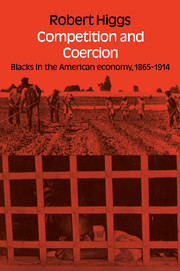Book contents
- Frontmatter
- Contents
- List of tables
- Preface
- “Race” and “racial discrimination”: A prefatory note on usage
- 1 Approaching the facts
- 2 The people
- 3 The people at work, 1865–1880
- 4 The people at work, 1880–1914
- 5 The fruits of their labors
- 6 Overview and interpretation
- Technical appendix
- Notes
- Select bibliography
- Index
- Frontmatter
- Contents
- List of tables
- Preface
- “Race” and “racial discrimination”: A prefatory note on usage
- 1 Approaching the facts
- 2 The people
- 3 The people at work, 1865–1880
- 4 The people at work, 1880–1914
- 5 The fruits of their labors
- 6 Overview and interpretation
- Technical appendix
- Notes
- Select bibliography
- Index
Summary
“They cannot take care of themselves,” it is said; “they can neither take care of their children, nor manage themselves in sickness, nor bring themselves to sanitary laws and habits, now that the benevolent eye of the slave-owner is withdrawn. It is a mere matter of time; they must die out in the end.” It is really quite surprising how seriously this is said, when it is so directly contrary to fact…. It is patent to the eye that they are not a people who have the least intention of dying out…. They are an inevitable fact, and it is incumbent on every well-wisher of America to make the best of them, instead of supposing that heaven will remove the difficulty.
Sir George Campbell, 1879In the spring of 1865 about five million blacks lived in the United States, some 90 percent of them just set free by the force of Northern arms. Tens of thousands of them were destitute, without homes or any source of material support. Many were refugees from battle zones, transients living at the mercy of their fellows and Northern troops; others huddled in makeshift camps scattered throughout the Southern countryside and outside the larger towns. Wherever they gathered, hunger and disease attended them, and epidemics of smallpox, typhoid fever, and dysentery ran rampant, sweeping away thousands. Infant mortality rose to unprecedented heights. On the plantations, where the bulk of the black population remained, conditions were somewhat better but still menacing.
- Type
- Chapter
- Information
- Competition and CoercionBlacks in the American economy 1865-1914, pp. 14 - 36Publisher: Cambridge University PressPrint publication year: 1977



